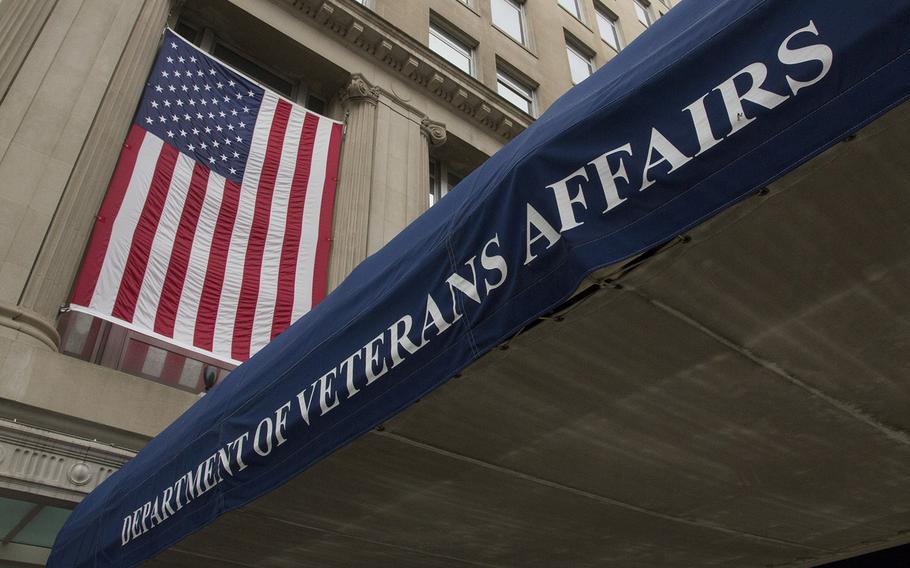
Dozens of measures to improve health care, job training and homeless programs offered by the Department of Veterans Affairs were introduced Thursday, May 16, 2024, as a single legislative package that some lawmakers predicted will advance quickly through Congress. (Stars and Stripes)
WASHINGTON — Dozens of measures to improve health care, job training and homeless programs offered by the Department of Veterans Affairs were introduced Thursday as a single legislative package that some lawmakers predicted will advance quickly through Congress.
Negotiated by the chairmen of the House and Senate veterans affairs committees, the sweeping package includes proposals to expand end-of-life home care, extend high-tech job training and connect homeless veterans with telehealth services.
Proposed measures also would bring greater urgency to providing intensive mental health treatment for veterans in crisis, according to lawmakers and veterans advocates.
“The men and women who have served and sacrificed for our nation have earned a VA that works with them — not against them,” Rep. Mike Bost, R-Ill., chairman of the House Committee on Veterans’ Affairs, said when the package was introduced. “Over the past year and a half, we have listened to veterans and stakeholders to find the gaps within VA services and consider commonsense legislation to improve them where we can.”
The package has support from several veterans groups including the American Legion, Disabled American Veterans, Wounded Warrior Project and Paralyzed Veterans of America.
Called the Elizabeth Dole 21st Century Veterans Healthcare and Benefits Improvement Act, the legislation includes major health care initiatives that would stop the VA from overriding referrals for veterans seeking community care from non-VA doctors and enable the VA to find an alternative vendor to Oracle Health for updating online systems for health records and automated appointments, which have been plagued with performance problems.
The legislation also would renew a popular high-tech training program, the Veteran Employment Through Technology Education Course, known as VET-TEC, which prepares veterans for jobs in information technology.
A five-year pilot program that ended in April would resume through Sept. 30, 2026, under the legislation. Starting salaries for graduates of the program averaged at about $66,000 per year, according to the VA.
Up to 4,000 veterans would be allowed to enroll yearly in VET-TEC. Students would qualify for benefits under the post-9/11 GI bill, covering tuition and housing allowances.
In proposed reforms to health care, family caregivers of veterans who are sick and disabled would be eligible for mental health care through the VA.
The bill also would increase coverage to 100% from 65% for in-home, end-of-life care for veterans who otherwise would be sent to nursing homes.
The VA also would make exceptions for higher-cost, at-home assistance for veterans with spinal cord injuries or amyotrophic lateral sclerosis, also known as Lou Gehrig’s disease. Veterans are twice as likely than the general population to suffer from Lou Gehrig’s disease, a terminal medical condition.
Legislation for improving services to homeless veterans would provide free cellphones and underwrite service plans to connect veterans living on the streets with their doctors, family members, prospective landlords and jobs.
Legislation would also seek to guarantee that homeless veterans could access remote telehealth visits with their doctors by using phones or internet connections provided by community facilities that serve the homeless population and receive VA funds.
The VA also would renew a temporary initiative established during the coronavirus pandemic that had provided homeless veterans with blankets, clothing, food and free transportation to medical appointments.
In the area of mental health care, legislation would require veterans deemed to be in urgent need of intensive mental health care to be admitted for in-patient treatment within 48 hours of determination by a clinician.
The VA would be required to allow veterans and their families to appeal decisions that delayed or denied former service members from receiving the intensive mental health treatment.
If VA treatment is unavailable in the state where the veteran lives, the VA must refer the veteran for non-VA care or send the veteran to a VA facility out of state, according to legislation.